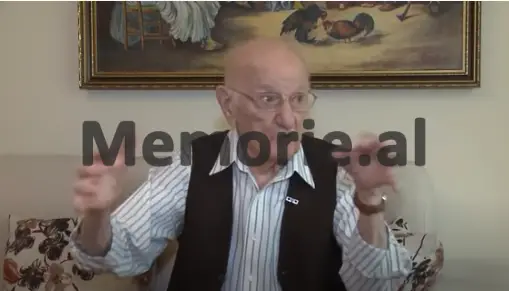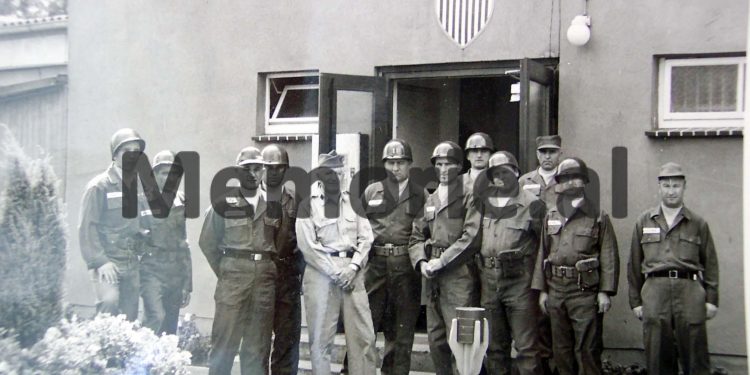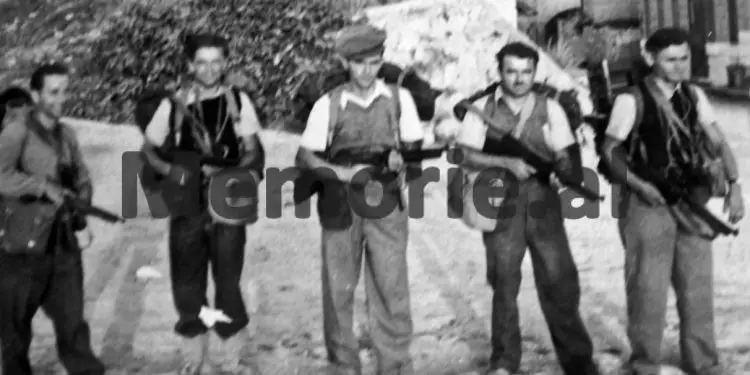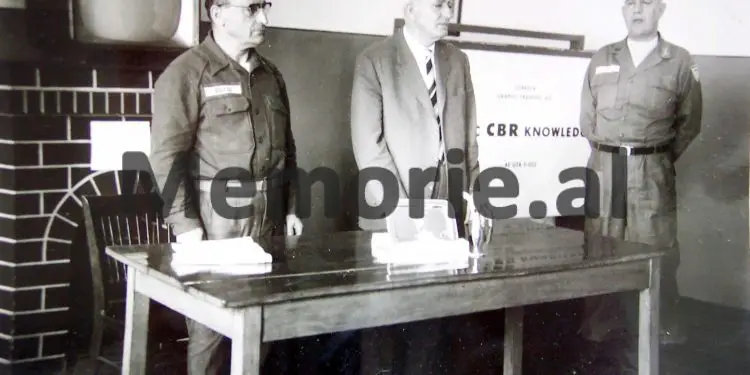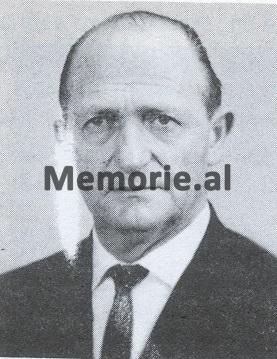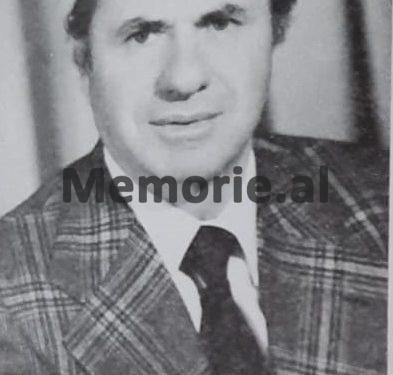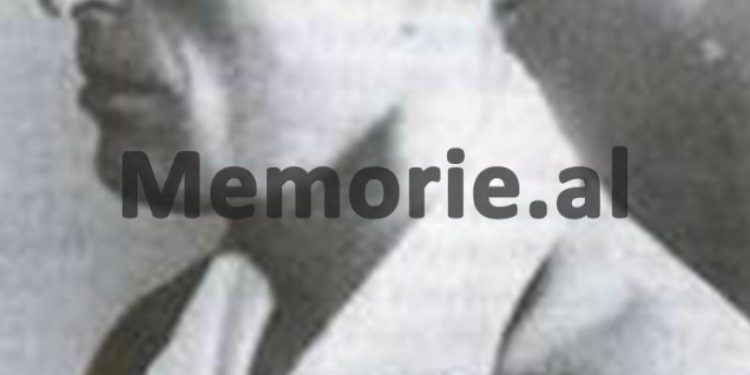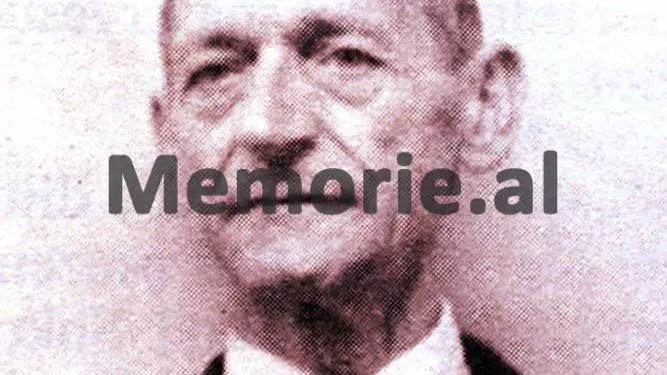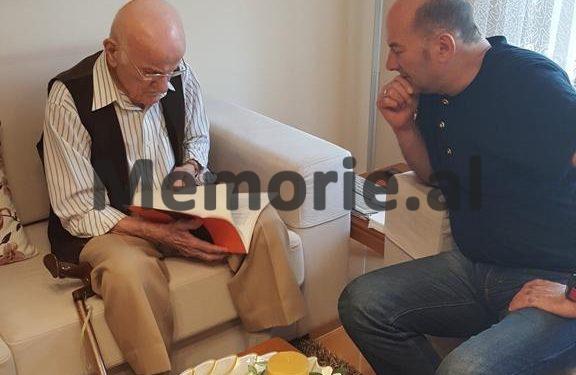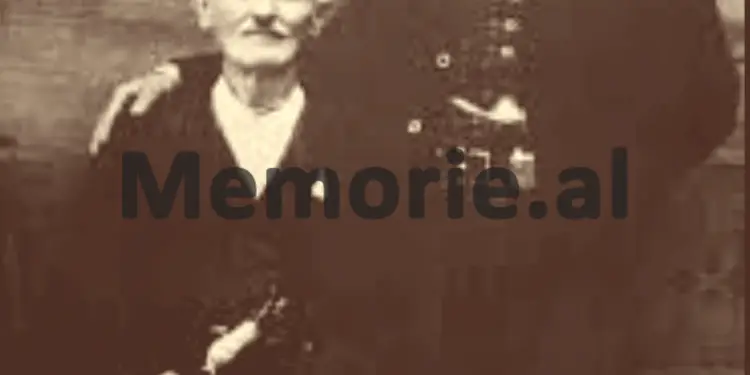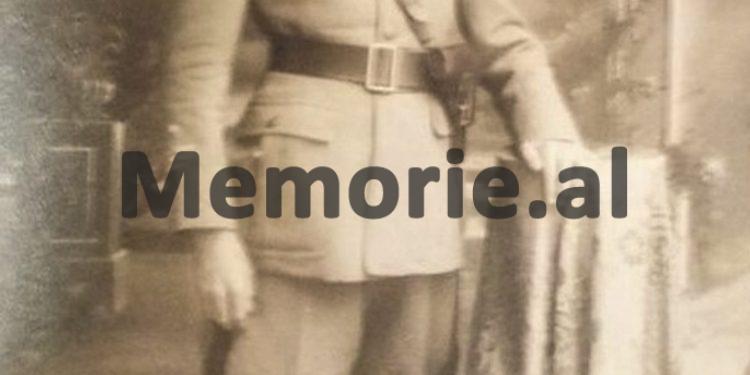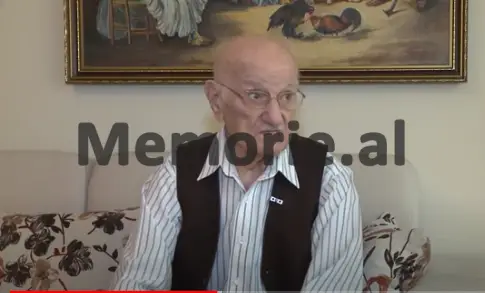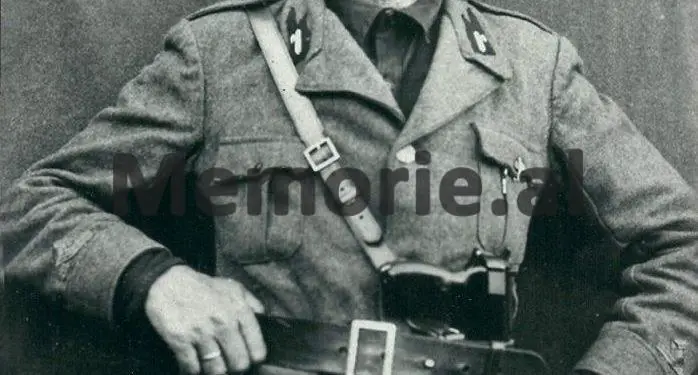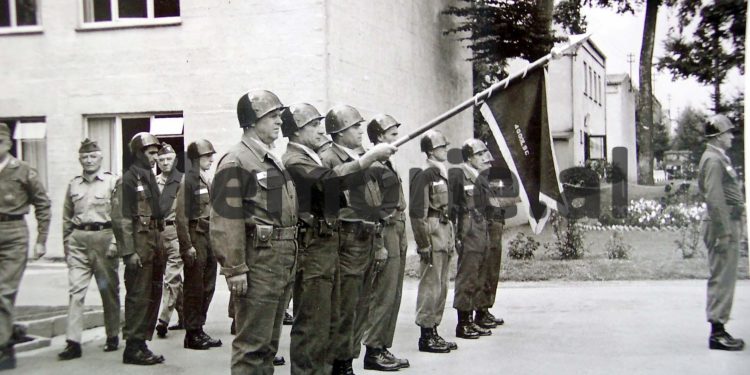Dashnor Kaloçi
Memoria.al publishes the rare and unknown story of Ndue Mëlyshi from Mirdita, where his father, Gjoni was the bayraktar of Kthella, while his brother, Nikolla during the period of the Bird Monarchy served as a soldier in the Royal Guard, and the son their uncle, Frroku, in the Gendarmerie weapon. How the roads were temporarily divided between the two cousins during the occupation of the country, after Frroku fought against the partisan forces in the South of Albania and at the end of the War, he joined Gjon Marka Gjoni in the city of Shkodra, taking revenge for the murder of Lieutenant Colonel Adem Boletini (son of Isa Boletini), from the communists, while Nikola became a partisan, joining the VII Assault Brigade commanded by Gjin Marku, Ramiz Alia and Adil Çarçani, fighting all the way to Visegrad, Yugoslavia. Ndue Mëlyshi’s rare testimony of how he was forced to flee in 1947 with his brother Captain Nikoll Mëlyshi, Pal Mëlyshi’s father (the main character in the movie “Operation Fire”) after the communists burned down the towers and the whole family with women and children were interned in the camps of Kruja, Berat, Tepelena, etc. How did Nduja stay in the mountains of Mirdita in the struggle with the Pursuit Forces until ’49 when he was forced to flee to Yugoslavia together with 53 members of the anti-communist resistance, after the murder of Bardhok Biba, after his brother Lleshi and uncle’s son were shot , Frrok, whose body was cremated with kerosene to terrorize the people of that province. Ndue parachuted into Albania after being trained by the Americans in the Italian camps and wandering through the mountains of Mirdita and Puka until 1952, when he finally left Albania for Italy, Germany and the USA, where he lived until in 1992, when he first returned home to his family (living in the city of Shkodra with his daughter, Bardha Mëlyshi, without returning to the US from 2014) until he passed away on July 31, 2020 , at the age of 109 and was escorted yesterday to the last apartment.
“Bardhok Biba was sentenced to death by our organization and I am sorry that I did not have the opportunity to kill him with my own hand, as he was Stalin’s puppy and not Albanian.” After the answer given by Mark Jak Bajraktari, Major UDB arkarkiç, did not continue the process of questioning our group of Albanians and closed it at all. This made that a few days later, in June, in the camp of Nis where we were, the UDB Major, Cedo Mihjovic came and called Ndue Pjetër Gjonmarku, Ndue Bajraktari, me (Ndue Mëlyshin), Mark Dodë Lleshjan, Marka Jak Bajraktari and Pjetër Kol Preçi. After calling us in the office, he told us that during the period we were in camps and prisons, we had gone through difficulties, because according to him, the situation in Yugoslavia was still turbulent, but we should not be too upset, as the main thing was the fact that we were alive, because in not a few cases our lives were in danger. After this introduction, he went directly to the topic, telling us that he had personally intervened in our case and had talked to the Ministry of Interior, to release us from prison, on condition that we form six small groups with by three people and to enter Albania with secret missions ”. The man who speaks and testifies for Memorie.al is Ndue Mëlyshi, originally from Kthella e Mirditës, a former member of the anti-communist resistance forces, who fled Albania in 1949 and parachuted into Albania after being trained by the Americans in the camps of Italy. Returning to Albania in 1992 after four decades of emigration, Ndue Mëlyshi, from 2014 lived in the city of Shkodra with his daughter, Bardha Mëlyshi, until he passed away on July 31, 2020, at the age of 109 and yesterday on August 1 was escorted to the last apartment. Although he carried on his shoulders more than a century and a decade of his life, even with endless deprivations and vicissitudes, spending almost half a century away from his family, wife and three daughters he left very young and found them with children, memory and memory never betrayed him until the last minutes when he passed away three days ago, (July 31, 2020) sitting in his armchair browsing the daily newspapers. Recently, Memorie.al managed to get a long interview with Mr. Ndue Mëlyshi, (recording it with video) in order to publish it on August 7, on the occasion of the sensational event of the murder of Bardhok Biba, an event that terrorized Mirdita and led to the departure of him and 53 members of the anti-communist resistance from Albania. During the conversation, his extraordinary memory as a “living folder”, sometimes came to his aid and notebooks where for years in a chronological way he has thrown pieces and moments from his troubled life, or the book “Mountain Life”, which he published several decades ago when he was in political asylum in the US. Conveying to the Mëlyshi family the condolences for the loss of their beloved man, in this article we are publishing in full the whitewashed interview we received recently (with the unstinting help of his daughter, Mrs. Bardha Mëlyshi), completing even with some of his notes.
Continued from the previous issue
Mr. Ndue, what was the purpose of that secret mission that Major suggested to UDB to carry out in Albania?
According to him, the purpose of the secret mission that we would carry out in Albania, was to look closely at the internal situation that prevailed there and we would return again for a very short time to Yugoslavia. After that, he added that all the other members of our group, without exception, the decision was made and they would be sent to different jobs and with good salary, having all the rights and freedoms as they enjoyed all Yugoslav citizens.
What answer did you give to the Yugoslav UDB officer?
After the proposal he made to us, he left us only for a while so that we could talk to each other calmly and without his presence, and then give him an answer.
What did you talk about and how did you decide?
We talked to each other and we all agreed that: given the extremely difficult situation where our comrades were in Nis prison (where, although there were some conditions, he still remained in prison), as well as always having in mind our families and the people who had kept us sheltered during our mountain life in Albania, so as to know their fate, as well as also having a hope that Western countries were interested in us and the anti-communist ideals we were fighting for. we decided to say yes to the proposal made to us by Major Cedo Mihjovic.
What did you do after responding positively to his “offer”?
After that, together with him, after the lists of groups of three people were compiled, he left for Belgrade to get the approval of his bosses, leaving us waiting when he returned to meet us again.
When did he return and what was said?
Major Cedo Mihjovic returned on June 10 and told us that his plan had been approved, but that a change had been made in what he had submitted to us.
What difference?
There would not be six groups of three people as he told us at the beginning, but only one group of three people. Of these two people would be companions, while the third would be the leader of the group and only he would know everything about the mission that would be performed.
And who were chosen to come on a mission to Albania?
In the presence of Cedo Mihjovic, I was elected with Mark Jak Bajraktar and Pjeter Cup Qafa. After that, according to the word he had given us, on the same day, Major Mihjovioi released all our comrades from prison and sent them by truck to Ovskar Banja (Serbia), where they would work as a salaried worker at a Power Plant. which was being built on the Ibar River.
What happened next to you, where were they sent?
Ten days later, an officer came and picked us up and sent us to Pristina, where Major Cedo Mihjovic was waiting for us, and at our request, he allowed us to go and pay a visit to Pjeter Cupi’s house in Vuciterna, where we we stayed only one night. The next day we were taken and sent to the city of Gjakova, where we were accommodated in a house that was somewhat away from the residential area and there was only one officer who brought us food.
How long did you stay in that house?
We stayed there for about two weeks and during those days we were served by a communist lady, who did our services and we somehow recovered from the suffering we had gone through during our stay in Nis prison. The day before we left that house to leave on a secret mission to Albania, we were visited and visited again by Major Cedo Mihjovic, who told us what our requirements were, before we left to cross the border. Then they prepared us with weapons and other necessary equipment that we would need for our landing in Albania and on July 7, 1950, Major Cedo Mihjovic met us with Arif Selmani and Rustem Thaçi, who were two people that would guide us on the route of the long road that we would traverse to enter illegally within the Albanian territory.
Where were Arifi and Rustem Thaçi and why were they in Yugoslavia?
Arifi and Rustem were both from Pukja and as far as I remember, Rustem was from the village of Sakat. The two had fled to Yugoslavia to escape persecution after being wanted by State Security forces for being arrested because they had been dictated to have sheltered and given bread to mountain people, as we communists call us. They were both brave, loyal boys and had helped many of our groups when we were in Albania.
After meeting Arif and Rustem, where did you go?
After meeting with Arif and Rustem together with the group of officers who accompanied us, we went to a place called Va-Spas and there we took refuge in the house of Hysen Prushi which was located near the border.
How did you enter the Albanian border, did you have problems with the border forces or residents of the area?
Hysen Prushi prepared a group of armed boys from his tribe and on the night of July 7, 1950, he accompanied us himself, escorting us to Qafë i Prushit, where we crossed the border and entered the Albanian territory without any obstacles. After entering the interior of the Albanian land, Hysen Prushi and the people who accompanied us returned to where they had come from, while I with Marka Jaku and Pjetër Çup Qafë, accompanied by Arif Selmani and Rustem Thaçi, on July 9 passed Drin river and we took the road to the forests of Sakat village in Puka area, from where Rustem Thaçi was from, as I told him.
How long did you stay there in the forests of Sakat village of Puka?
After arriving in the forests of Sakat, we took the road to the Kryeziu Mountain and there we parted.
Where did you go?
Marka Jaku and Pjetër Çupi and I headed for the Mirdita area, while Arifi and Rustem left for their region in Va-Spas, leaving to meet again at a designated place on August 26, 1950. So on On July 13, Marka Jaku and Pjetër Çupi and I arrived in the Puka area and immediately entered our first base in Fushë i Arzit, where we were greeted by two brothers, Nikol and Pjetër Shkoza, who were two of the most loyal people. which housed the anti-communist resistance groups of the Northern provinces. The two Shkoza brothers, after sheltering us and supplying us with the necessary food, informed us about the internal situation, telling us about the events that had taken place during that time after the murder of Bardhok Biba and the group of six led by Preng Dodë Gjini.
What about your families that you had left in Albania, did the two Shkoza brothers have news?
Yes, they had that day from the two brothers Shkoza, I received the sad news of the murder of my brother, Llesh Mëlyshi and two nephews, Paul and Mark Mëlyshi. Also that day, the two Shkoza brothers informed us about the shelter they had provided to the parachute groups that had landed in those areas, such as Kol Çuni, Alush Lleshanaku, Gjon Gjinaj, etc. From them I learned that Alush Lleshanaku was alive and had landed for the second time with a parachute in Albania. That same night, the two Shkoza brothers, through their loyal people, made the necessary announcements for our arrival, announcing the bases in the area of Puka and that of Kurbin.
What about your arrival in Albania, when you announced it to those who had left?
After meeting with the Shkoza brothers, Marka Jak Bajraktari and I prepared some information to give to Kol Çuni, who was in the mountains of Puka and had a radio receiver coming in connection with the center and the Independent National Bloc in Rome. Kola got in touch and announced that we had arrived without a loss at our bases in the mountains of Puka and Mirdita. Also, together with those short news that we prepared, we asked Kol Çuni to prepare a meeting point with Alush Lleshanaku and Gjon Gjinaj on the radio.
Did you manage to meet Alush Lleshanaku?
Thanks to the accurate announcements made by the two brothers, Pjetër and Nikoll Shkoza, on August 10, 1950, my two friends and I had a meeting with Alushi and Gjoni in the Zadrima area of Lezha. There we talked for a long time with them, telling them all the events from the day that Alushi and I had landed for the first time in Albania with the Italian plane launched from the secret base of the CIA, where the American officers had trained us.
Who introduced them to the CIA base?
With the Americans who had that secret base on the outskirts of Rome, we were connected by the main leaders of the Independent National Bloc, headed by Gjon Marka Gjoni, Kol Bibë Mirakaj, Ernest Koliqi, Ismail Vërlac, etc. All of our landing missions in Albania from Italy or Yugoslavia were coordinated by that CIA base through the Independent National Bloc.
Returning to your meeting with Alush Lleshanaku, who accompanied him?
Alush Lleshanaku and Gjon Gjinaj had with them a group of Kosovar paratroopers with whom they had landed in Albania, but unfortunately the best of them was missing, Captain Riza Hasani, who had been killed by communist forces in the first attempt during the landing in the village of Perlat of Kthella.
After meeting with Alushi and Gjon Gjinaj, what did you decide to do?
They presented their plan to us asking for help so that we could lead their group to go to Kosovo, where they were to carry out their mission. After a short break, together with Lleshanak’s group we set off towards the base of Kol Çuni in the mountains of Puka and on August 16 we arrived in the forest of Iballa, where the radio center of Kol Çuni was located.
How long did you stay there?
At that base we stayed for six days and Kol Çuni got in touch with the radio with the center in Rome, making a description of the whole mission of our group and from the center we got the approval to go back to Yugoslavia, as our mission was called over. . One of the reasons we asked to return to Yugoslavia was the interest in our group of friends who were working at the Ovac-Banja power plant in Serbia. So on August 26, 1950, according to the meeting point we had left with Rustem Thaçi and Arif Selmani, we arrived at the designated place in the Sakati forest and from there together with them, we had a plan to make another trip to Albania. as soon as possible, before winter begins.
Did you take that trip?
No, because Marka Jak Bajraktari refused that trip so fast, because of his poor health, and it was approved by Yugoslav Major Cedo Mihjovic. After Marku’s withdrawal, the mission was assigned to me and Pjetër Qafë, but I asked Major Mihjovi, to come with us to that second mission, my two friends, Zef Dodë Lekëgega and Bibë Mark Biba, who were working in Ovcar-Banja. I made that request thinking that Zefi and Biba were close friends with me and they had a long experience of a mountain life. The Yugoslav major gladly accepted my request and immediately brought Zef and Biba to Gjakova.
How do you remember your second mission in Albania?
After making the necessary preparations, on September 29, 1950, Pjetr Qafë, Zefi and Biba and I took the road entering Albania on the same route as the first time, accompanied again by Arif Selmani and Rustem Thaçi. In Va-Spas my group and I parted from Arifi and Rustemi, leaving for the area of Kthella and left a meeting point with them on October 8 in Sakati Forest. After passing many villages we arrived again in the village of Shkoza, to our two friends, brothers Pjetër and Nikoll Shkoza. From both of them we were supplied with food and were informed about the situation in the country, learning that Alush Lleshanaku and Gjon Gjinaj were in the area of Munella in Mirdita.
Where did you go after that?
After that, my group and I left for the area of Kthella and with the two brothers Shkoza, we left an appointment to meet again together with Alushi and Gjon Gjinaj on November 2 at the house of Nikol Shkoza. After we went to the Kthella area, my group and I returned to the Puka area and on November 3, we met with Alushi and Gjon Gjinaj in the village of Shkoza.
What did you discuss at that meeting?
There we discussed at length with them talking about the difficult situation that prevailed in the country due to the pursuits of the State Security and the bad weather that was approaching with the arrival of winter. After that we parted with Alushi and the group he led, as he had to return to fulfill his mission in his province of Elbasan. While Gjon Gjinaj was missing the group’s radio-telegraph operator, Pjetër Gjocaj, with whom they had lost contact since the Perlati fighting in June 1950. Due to the numerous pursuits of the communist forces, Gjon Gjinaj’s group had found it impossible to got in touch with Pjetër Gjoci, who was the only one who knew the use of the radio and its number.
What did you decide after this difficult situation where you and the other groups were?
For these reasons, my group and I decided not to return to Yugoslavia, but to help Gjon Gjinaj’s group, which was approved by the Center in Rome, after the intervention of the leaders of the Independent National Bloc, such as Gjon Marka Gjoni etc. But while I was staying in Albania, I sent Pjetër Qafën to meet with Arif Selmani and Rrustem Thaçi in the place we had left before and after that on November 8, 1950, Pjetr left for Yugoslavia./Memorie.al




